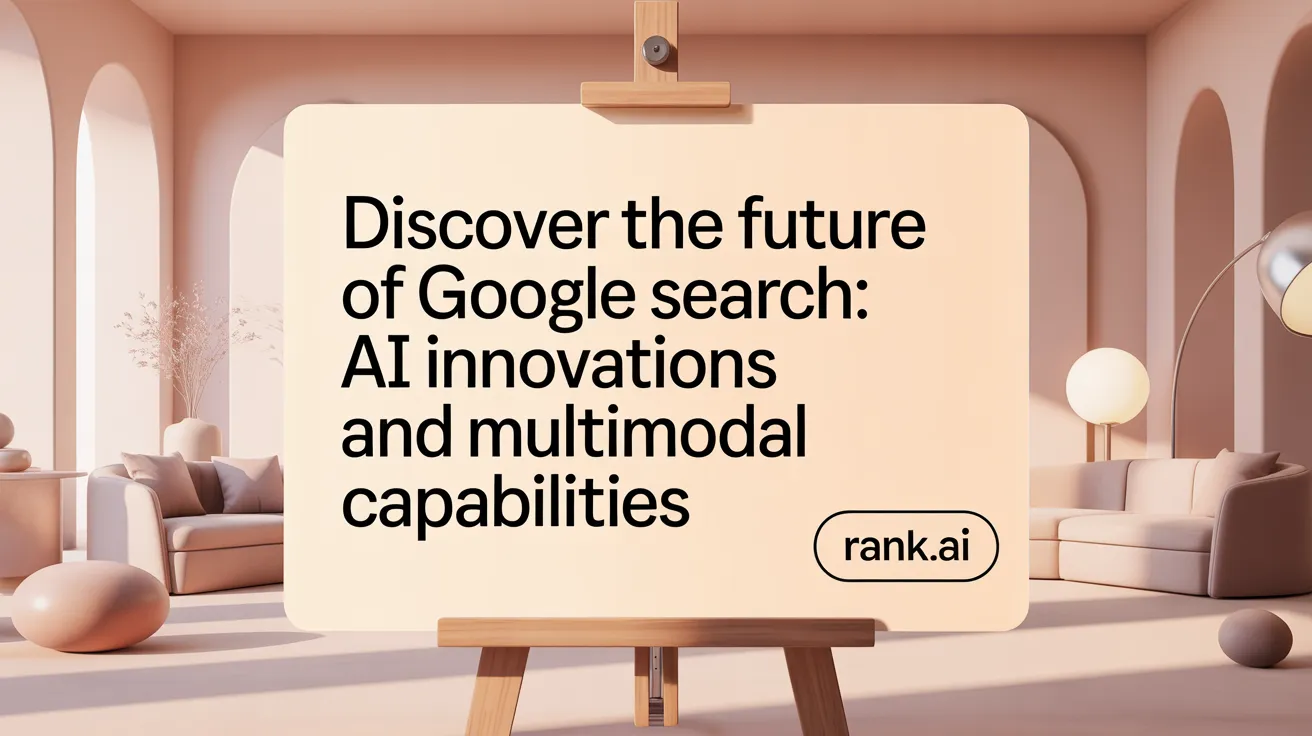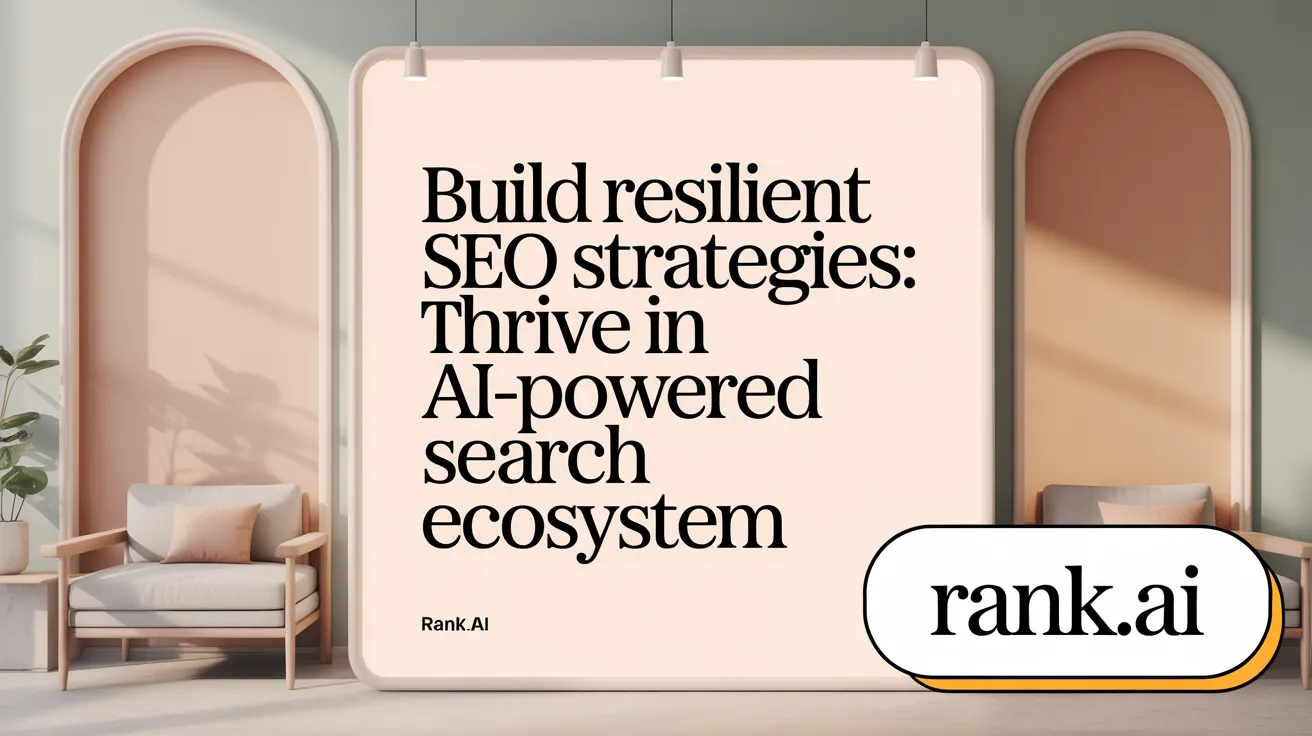Understanding the New Era of Search Optimization
As we step into 2025, search engines have evolved far beyond traditional keyword matching, driven by sophisticated AI and machine learning models. Mastering website optimization in this landscape means embracing these advances and aligning strategies closely with user intent, search behavior, and emerging AI features. From Google’s integration of models like BERT, MUM, and the Search Generative Experience to the growing importance of multimodal content and E-E-A-T principles, this article explores how businesses and SEO professionals can adapt to and flourish in AI-powered search environments.
Foundations of Effective SEO in an AI-Driven Landscape

What are effective strategies for optimizing websites for AI-driven search systems in 2025?
As AI increasingly shapes the way search engines interpret and present information, adapting SEO strategies is crucial. In 2025, successful SEO hinges on delivering content that aligns closely with user intent. Focus on creating original, comprehensive, and human-centered content that answers specific questions and provides tangible value.
Implementing structured data markup, such as schema.org schemas, significantly enhances how AI understands your webpage. Proper schema usage can lead to richer search results, including featured snippets, answer boxes, and knowledge panels, boosting visibility.
Technical SEO remains foundational. Optimizing site speed, ensuring mobile responsiveness, and prioritizing accessibility not only improve user experience but also meet AI crawler standards. Secure sites (using HTTPS) are favored by search algorithms and build user trust.
Supporting your content with multimedia elements like images, videos, and voice search optimization expands your reach. Multimodal content caters to diverse user preferences and enhances the chances of appearing in various AI-driven search features.
To stay ahead, leverage AI tools that aid in content analysis, personalization, and trend monitoring. These tools help refine your strategy, maintain relevance, and adapt quickly to evolving AI search behaviors.
| Strategy Focus | Description | Best Practices |
|---|---|---|
| Unique, valuable content | Create content that directly meets user needs and answers questions truthfully | Use original data, clear sources, and real-world examples |
| Structured data & schema | Improve AI understanding and enhance appearance in rich results | Implement schema markup relevant to your content types |
| Technical SEO priorities | Ensure site is fast, mobile-friendly, and accessible | Regular audits, optimize images, fix bugs |
| Multimodal content | Use images, videos, and voice to broaden search visibility | Optimize media files, use proper tags and transcripts |
| AI-powered content tools | Use AI for content creation, analysis, and trend adaptation | Balance AI assistance with human oversight |
Effectively navigating the evolving AI-driven search landscape requires a balanced approach that prioritizes user intent, technical excellence, and rich, accessible content.
Emerging Trends and AI Innovations Shaping Google Search

What future trends and developments are expected in Google and AI-driven search systems?
Google's search landscape is rapidly evolving with advancements in AI technology. One notable trend is the integration of multimodal search capabilities. Tools like Google Lens and Project Astra aim to make search more interactive by combining visual, voice, and video inputs, allowing users to engage with search engines through more natural and intuitive methods.
The development of sophisticated AI models such as Gemini 2.0, MUM, and BERT continues to refine Google's ability to understand context and nuance. These models enhance the accuracy and relevance of search results, enabling Google to deliver comprehensive AI Overviews and summarizations directly in search snippets. AI Mode, a new feature, supports deep reasoning, follow-up questions, and access to real-time data, further enriching the search experience.
Another significant trend is the automation of complex web tasks by AI agents. These agents can navigate websites, make reservations, and perform multi-step processes without user intervention, offering a seamless, user-centric online experience.
Personalization is becoming more advanced as Google leverages user data and integrations with Google apps like Gmail to deliver highly tailored suggestions and assistive search results. This personalization facilitates more relevant content delivery, improving user satisfaction and engagement.
Moreover, AI innovations are transforming SEO strategies. Content creation, data visualization, and site optimization now increasingly depend on AI-driven tools that ensure high-quality, accurate, and engaging content aligned with user intent.
In conclusion, the future of Google search is set to be more interactive, intelligent, and personalized. As AI models improve and new functionalities emerge, search will become more intuitive, context-aware, and supportive of complex online activities, making digital interactions smoother and more effective.
Content Creation and Technical SEO Best Practices for AI Search Algorithms

What are the best practices for content creation and technical SEO that align with AI search algorithms?
Creating content that performs well in AI-driven search landscapes involves a focus on quality, relevance, and technical soundness. Content should be comprehensive, authoritative, and tailored to meet the user's intent. This means addressing specific questions, providing detailed information, and supporting claims with real-world examples and original data.
Using clear, natural language helps AI understand the context and purpose of your content. Proper optimization of meta tags—titles, descriptions, and headers—with relevant keywords also signals topical relevance to search engines.
Structured data markup is crucial for enhancing search result appearances, enabling rich results like snippets, FAQs, and videos. Structuring your website logically with a clear architecture improves crawlability and indexability, which are highly valued by AI algorithms.
From a technical perspective, fast site loading speeds, especially on mobile devices, are essential. Ensure your website is secure with HTTPS and accessible to users with disabilities. Utilizing AI-powered analytics tools can provide insights into user behavior, engagement, and conversion patterns, helping refine your SEO strategies accordingly.
In summary, aligning SEO practices with AI algorithms involves a mix of high-quality content creation, effective technical setup, and ongoing data-driven adjustments to stay ahead in evolving search environments.
Evolving Ranking Factors and Semantic Optimization in AI-Powered Search

How are search engine ranking factors evolving with AI-powered search, and what does this mean for SEO?
As AI-driven search becomes more prevalent, traditional keyword-focused SEO strategies are shifting towards a broader emphasis on understanding user intent and semantic relevance. Instead of relying solely on matching keywords, search engines now analyze the context and meaning behind queries using advanced natural language processing (NLP) models.
Models like RankBrain, BERT, and MUM play crucial roles in this evolution. They process vast amounts of data to interpret nuances in language, determine the intent behind searches, and evaluate content quality. These AI systems help search engines assess whether content is authoritative, relevant, and trustworthy.
Furthermore, structured data markup like schema.org enhances AI's understanding of content, making it easier for the algorithms to recognize and categorize information accurately. This contributes to better ranking signals and increased chances of content appearing in featured snippets or as direct answers.
The rise of features such as Search Generative Experience (SGE) and zero-click answers shifts focus toward content that AI can easily extract and present. Content needs to be well-structured, comprehensive, and demonstrate expertise—adhering to E-E-A-T principles (Experience, Expertise, Authority, Trustworthiness). Providing original data, real-world examples, and clear sources helps establish credibility and boosts visibility.
SEO strategies must adapt by creating high-quality, intent-aligned content optimized for AI understanding. This includes thorough topic coverage, fast mobile-loading websites, accessible design, and rich structured data. The goal is to satisfy both users and AI systems, ensuring content remains prominent amid the evolving SERP landscape.
In summary, AI-powered search has transformed ranking factors from simple keyword matching to sophisticated semantic analysis. Success now hinges on content that resonates with user intent, demonstrates authority, and leverages technical SEO best practices to thrive in the 2025 search environment.
Adapting SEO for Dynamic SERP Features and AI-Driven User Intent

How should SEO approaches be adapted to changes in SERP features and evolving user intent influenced by AI?
As search engine results pages (SERPs) evolve with new features driven by AI, SEO strategies must adapt accordingly. This includes optimizing content for rich snippets, featured snippets, and knowledge panels, which are becoming more prevalent as AI systems highlight specific answers.
Understanding user intent is more critical than ever. AI models like BERT, MUM, and RankBrain analyze language nuances and context, meaning that content must go beyond keyword matching. Creating clear, concise, and informative content tailored to answer specific questions helps meet these AI-driven interpretation methods.
Optimizing for structured data and schema markup enhances visibility within advanced SERP features, increasing the chance that your content appears in rich answers or knowledge panels. Additionally, prioritizing mobile-first design and seamless user experiences ensures your site responds well to diverse interaction modes.
By aligning your SEO efforts with AI’s interpretation of queries, you can improve your chances of appearing in featured snippets, answer engines, and voice search results. The combination of technical enhancements, high-quality content, and understanding of evolving user behaviors is essential for maintaining visibility in modern search landscapes.
Building Long-Term SEO Strategies for Sustainable Success in AI Search

How can businesses plan and implement long-term SEO strategies to succeed in AI-driven search environments?
To thrive in the evolving landscape of AI-powered search, businesses must craft resilient SEO strategies that are aligned with the latest technological advancements and user expectations. Central to this is developing authoritative content rooted in expertise, authenticity, and original insights. Employing expert input and original research not only boosts credibility but also enhances the content's relevance, making it more appealing to AI algorithms that prioritize helpful and well-structured information.
Leveraging AI analytics tools plays a crucial role in ongoing SEO refinement. These tools help monitor changes in AI search features like RankBrain, BERT, and MUM, as well as notable shifts in user search behavior. Analyzing data allows businesses to adapt quickly, optimizing content format and technical elements like schema markup, site speed, and mobile responsiveness. Structured data, such as schema, makes content more understandable for AI, increasing chances for rich snippets, featured snippets, and voice search visibility.
Emphasizing semantic HTML and structured data enhances content clarity and accessibility, which are vital in today's search landscape driven by AI's understanding of context and nuance. Fast-loading, mobile-first websites with excellent Core Web Vitals are essential ranking factors. These technical foundations ensure the site remains user-friendly and accessible to Googlebot, fostering better indexing and ranking.
Building external authority is equally important. This involves earning meaningful backlinks, gaining brand mentions, and fostering social proof—elements that signal trustworthiness and relevance to AI algorithms. An active community presence across multiple digital platforms can elevate brand credibility, further supporting search rankings.
Furthermore, fostering collaboration among content creators, technical teams, and data analysts ensures that all aspects of SEO work cohesively. By sharing insights and aligning strategies, teams can produce content that meets user intent, adheres to evolving AI standards, and supports broader business goals. Transitioning focus from mere keyword optimization to topic-based, intent-driven content prepares businesses for the future of AI search, where contextual understanding takes precedence.
In the long run, staying adaptable and proactive is vital. Businesses should continuously invest in technological upgrades, monitor AI trends, and optimize content for emerging formats like answer engines and zero-click solutions. By doing so, they can sustain visibility and remain competitive in the increasingly AI-dominated search landscape.
| Strategy Area | Focus Points | Additional Details |
|---|---|---|
| Content Creation | Expertise, Originals, Relevance | Use expert insights, original data, and focus on user intent |
| Technical SEO | Site Speed, Mobile, Structured Data | Optimize for Core Web Vitals, schema markup, and fast mobile experiences |
| Authority Building | Backlinks, Mentions, Social Proof | Gain recognition through reputable links and active engagement |
| Data & Analytics | Monitor AI Features, Adjust Accordingly | Use AI tools to refine strategies, analyze user behavior |
| Collaboration | Content, Tech, Data Teams | Promote cross-functional teamwork for cohesive SEO practices |
Following these comprehensive strategies enables businesses to adapt to the rapid evolution of AI search, ensuring sustainable success and ongoing relevance in 2025 and beyond.
Embracing the AI-Optimized SEO Future
As AI-driven search systems redefine how content is discovered and ranked, mastering optimization techniques that prioritize user intent, semantic relevance, and technical excellence is essential. By integrating sophisticated AI insights and leveraging emerging Google search features, businesses can craft strategies that not only satisfy evolving algorithms but also enhance user engagement and conversion. The key to lasting success lies in adaptability, continuous learning, and a commitment to quality that resonates both with humans and AI alike, positioning organizations to thrive in the complex and exciting search ecosystems of 2025 and beyond.
References
- Top ways to ensure your content performs well in Google's ...
- Mastering Search Engine Optimization: Strategies for 2025
- Google AI Search: Master SEO in 2025
- How to Rank in AI Search: Proven AI SEO Strategies for 2025
- How to Get the Most Out of Your AI-Powered SEO Strategy
- What Is AI SEO? How Artificial Intelligence Is Changing ...
- How to Rank in AI Search Results: 9 Effective Strategies
- AI Ranking Factors and Their Role in Modern SEO Strategies
- AI in Search: Going beyond information to intelligence
- AI Business Trends 2025



